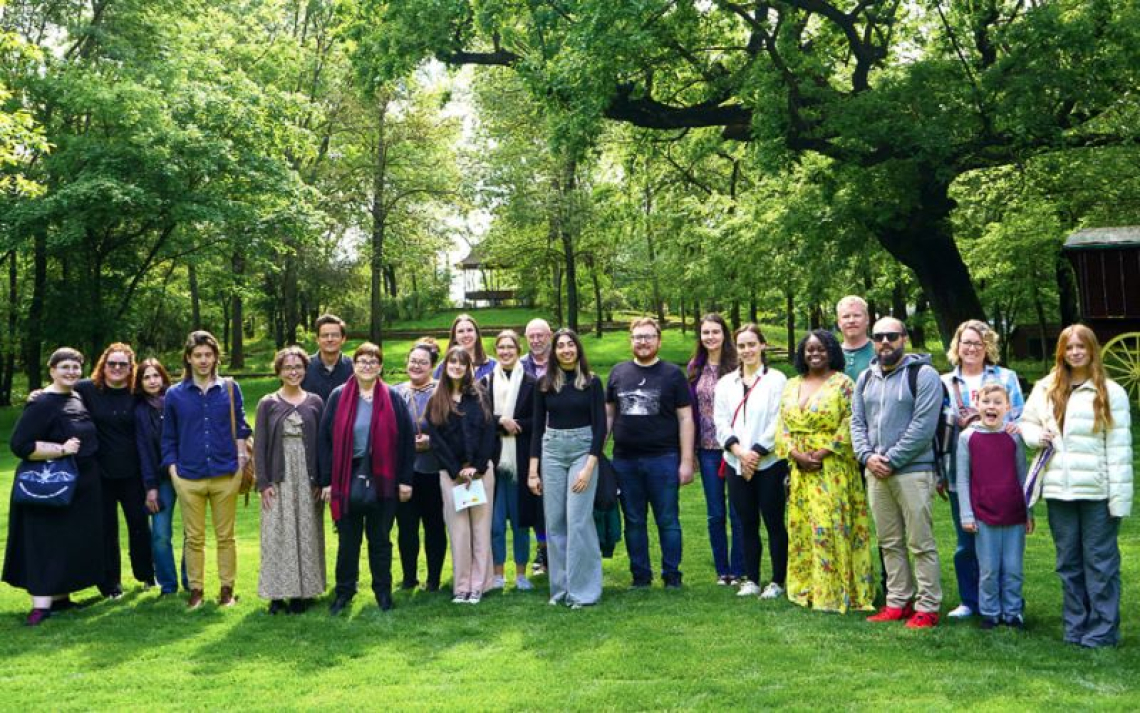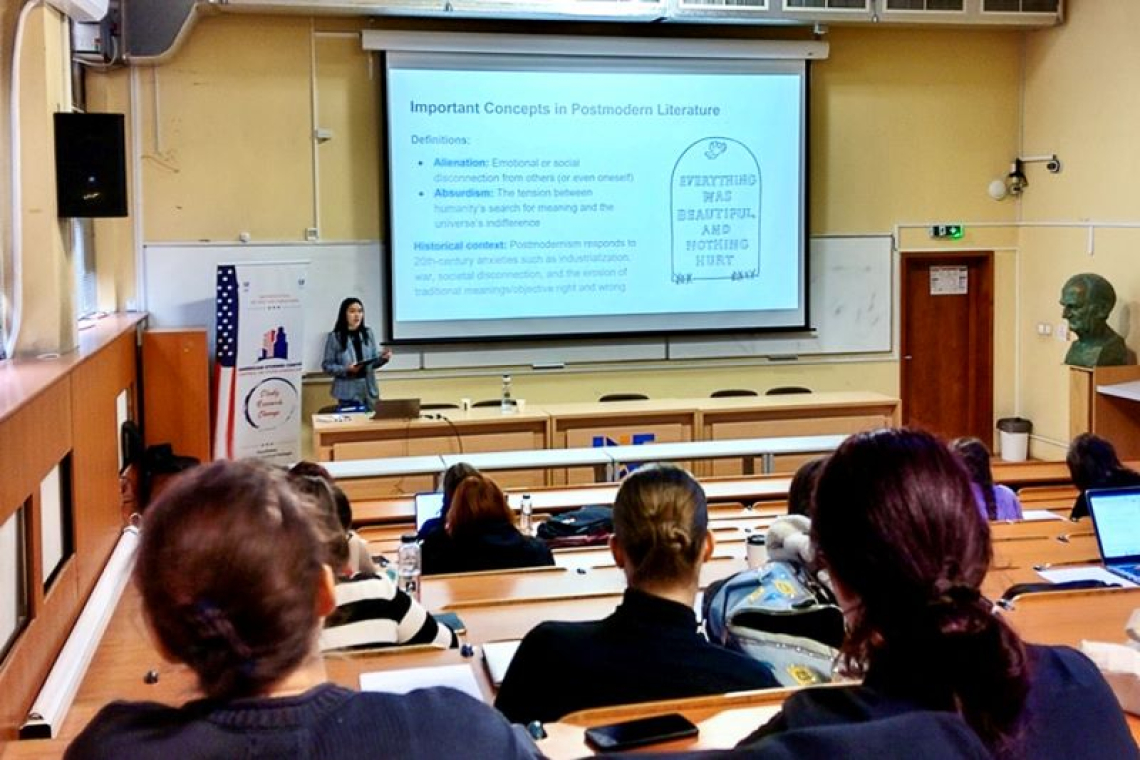Romania
12 English Teaching Assistant Award
Accepted Degree Levels
|
Grant PeriodOctober StartGrant Length9 Months |
Award Type
Award Profile

The English Teaching Assistant Program invites well-qualified candidates at all degree levels, with an interest in international education and teaching experience, to spend one full academic year teaching and/or assisting with practical and specialized English language courses and American culture classes in Romanian higher education institutions. At the same time, English Teaching Assistants will be integrated in the host community and gain from intensive cross-cultural interaction. Each host institution will tailor the assistantship to its language teaching needs and the grantee’s background, academic interests, and abilities, and will place the ETA under the supervision of a professor-tutor. ETAs will also serve as valuable resources for first-hand information about American culture, traditions, and society, and are informal ambassadors of the U.S.
Being a Fulbright ETA in Romania for 9 months will give individuals a chance to develop English teaching and other professional skills while learning about Romanian culture, people and language.
Grant Length
Grant Period
The grant length is 9 months, October through June, coinciding with the academic year in Romania.
The academic year in Romanian universities is divided into two semesters. The first semester runs from October to February, and the second semester runs from February to June. Examination sessions are typically scheduled in January/February and June. During the year, there are several breaks: winter break (end of December/beginning of January), inter-semester break (mid-February), Easter break (around Easter holidays), summer break (July and August), and all Romanian public holidays. Please note that universities establish their own calendar, in accordance with the principle of university autonomy, so there may be differences from one academic center to another.
Orientation
Grantees will be required to attend a multi-day in-country orientation at the end of September. This event typically covers topics such as the Romanian academic life and culture, the higher education system, practical information about living and teaching or doing research in Romania, and the specifics of your grant, but it also provides an excellent networking opportunity for the grantees.
Candidate Profile
Applications from candidates of all degree levels and academic backgrounds are welcome; however, preference will be given to graduate students with a demonstrated interest in international education.
Prior teaching experience is strongly recommended, and candidates with teacher certifications are particularly welcome. Applicants should provide detailed descriptions of their teaching experience and interest. Typically, ETAs in Romania instruct students in bachelor's and master's programs.
The Commission seeks grantees who are mature, flexible, responsible, and capable of working independently in diverse institutional settings across Romania. Moreover, applicants should be ready to navigate cultural differences and adapt to diverse academic, cultural, and social environments.
What is life like for Fulbrighters in the host country?
Applicants are expected to research their host country. Application materials should indicate a clear commitment to the host country community and a description of how you will engage with it.
Fulbright grantees in Romania enjoy a rewarding experience that blends academic engagement with cultural immersion. After an initial period of adjustment to local administrative practices and a different pace of everyday life, you will find a welcoming environment that fosters both professional and personal growth. The local academic community is open to collaboration and eager to engage with international researchers, and the Romanian-U.S. Fulbright Commission will help you settle in and support you throughout your grant period through orientation sessions, group meetings and other events, as well as personalized guidance.
Most Romanians will warmly welcome you into their country and offer you the opportunity to share in its rich and lively intellectual and cultural life. Many grantees discover that venturing beyond their city of affiliation reveals a deeper, more nuanced understanding of life in Romania, while exploring the countryside brings a slower pace of life and a more relaxed lifestyle. In this way, your Fulbright experience becomes not only a period of focused academic work but also a chance to immerse yourself in a setting that values thoughtful exchange, historical richness, and genuine hospitality.
Eligibility
6 Months
Degree Level of Applicant
- Bachelor's
- Master's
- Doctoral
Foreign Language Evaluation (FLE) Form
If required, submission of the Foreign Language Evaluation (FLE) form is mandatory, even if you have advanced skills or are a native speaker of the language. Failure to submit the required FLE form may impact your eligibility.
Additional Information: Romanian proficiency is not required. Some study of Romanian prior to arrival is encouraged in order to promote deeper engagement with the host community. Applicants must be native English speakers. English is widely spoken at least in the academic environment throughout Romania. The Commission also provides a one-time allowance of $800 for community integration, including Romanian language training, during the grant period.
Placement Type
- University/Post-Secondary Institution
The Fulbright Commission will place grantees at universities, usually, but not exclusively in American Studies or English Language and Literature Departments.
Details of assignments will be subject to direct communication between the selected candidate and the designated department of the Romanian university. Recent grantees were placed in Arad, Bacau, Baia Mare, Brasov, Bucharest, Cluj-Napoca, Constanta, Craiova, Galati, Iasi, Oradea, Sibiu, Suceava, and Timisoara. Positions combine teaching and/or assisting of up to 14 hours per week and office hours of up to 4 hours per week. Additional time will be reserved for an independent study/research project.
Besides classroom responsibilities, grantees may also be requested to give presentations on topics related to the United States, lead programs in language labs, conduct English conversation clubs, tutor, participate in sports, language or drama clubs and volunteer at local organizations.
Additional grant activities: In addition to their primary teaching activities, grantees are expected to support the Fulbright Commission and the mission of the Fulbright Program by delivering presentations, seminars, and workshops on U.S. higher education and culture.

Placement Locations
- Capital City
- Regional City
Grantees are placed in cities which have universities, capital city included.
Award Benefits
- A stipend broadly based on the cost of living in the host country. These funds may be used by the grantee to support housing, meals, and incidental costs during the grant period.
- International travel benefits
- Accident & sickness health benefits
- 24/7 mental health support line for urgent and non-urgent situations
- 12 months of non-competitive eligibility (NCE) hiring status within the federal government
- English language teaching preparatory course
Stipend Amount
This is an estimated amount and is subject to change. The financial terms of the grant will be confirmed in the grant document issued after selection.
Supplementary Project
Grantees are encouraged to engage in other activities related to their personal, career, and/or educational interests. This may be an independent study/research project or community service that will not conflict with their assigned assistant-teaching. Applicants should include a brief description of their supplementary projects in their Statements of Grant Purpose.
Estimated Cost of Living
Consider using cost of living comparison websites to gain a better understanding of the potential costs in your host country.
Useful information about the cost of living are provided here: Cost of Living in Romania
Dependents
Within the Fulbright U.S. Student Program, a dependent is (1) a spouse, or (2) a relative (child, parent, or sibling) who is financially dependent on the grantee. The dependent must accompany the grantee abroad for at least 80% of the grant period in order to receive the dependent benefit. The balance of maintenance expenses for dependents is the responsibility of the grantee. No allowance is provided for any adult dependent who holds a grant from any source. Transportation and insurance are not provided for dependents.
Housing Arrangements
Grantees are responsible for making their own housing arrangements. Securing housing, especially in larger cities, can take time, and it may be helpful to connect with former U.S. grantees to Romania for advice. The host institutions are not obliged to find housing for grantees, but may provide some assistance if needed. The cost of accommodation is covered by grantees from their stipend and relocation allowance.
Grant Benefits
STIPEND:
- $2,150 per month (part of the stipend is paid in installments to the U.S. bank account, while the rest is paid monthly in Romanian Lei based on the USD/RON exchange rate)
This is an estimated amount and is subject to change. The financial terms of the grant will be confirmed in the grant document issued after selection.
One-time payments, included in the 1st instalment:
- Travel and relocation allowance – $3,500
- Research and book allowance – $500
- Community integration allowance – $800 for Romanian language learning & specialized counseling
Dependent Supplements:
- Dependent allowance: $325 per month for one dependent / $425 per month for two or more dependents who accompany the grantee for at least 80 percent of the grant period (disbursed in RON based on the average USD/RON exchange rate as specified in the Terms and Conditions of the Award)
Special Award Benefits
In-country work-related travel: The Fulbright Commission reimburses travel costs for active participation (e.g. as lecturer, speaker, consultant) in academic activities, such as conferences, seminars, and workshops organized by other universities in the Romania (depending on availability of funds).
Romania Country Overview
Due to its historical circumstances and its geographical position north of the Balkan Peninsula, on the Lower Danube River and bordering the Black Sea, Romanian culture is a distinctive mix of Central and Eastern European influences, with Roman, Greek, and Slavic influences. From medieval castles and fortified churches to traditional villages and vibrant modern cities, Romania offers a fascinating history and a rich cultural heritage. The country is also known for its picturesque landscapes and varied natural settings, including the Carpathian Mountains, Europe’s largest and best-preserved Delta, sandy Black Sea beaches, and green hills dotted with forests and vineyards. If you appreciate outdoor activities and nature, Romania provides ample opportunities to explore its scenic beauty.
In recent decades, Romania’s higher education system has undergone significant structural changes, evolving from a state-controlled model prior to 1990 into a competitive, internationally engaged environment that values academic mobility and collaborative research. With a relatively low cost of living and high levels of English proficiency in academia, Romania provides an inspiring and accessible setting for scholars seeking to expand both their professional and cultural perspectives. As the country continues its steady economic and social development, it has proven to be an excellent host for the Fulbright Program, offering a wide range of research opportunities across various disciplines and memorable experiences for U.S. Fulbright grantees.
Fulbright Program Management Contact
Fulbright Commission/U.S. Embassy Website
Fulbright Commission/U.S. Embassy Contact
Additional Online Resources
Ministry of National Education: https://www.edu.ro/
Higher education in Romania: https://studyinromania.gov.ro/hes
List of current U.S. Fulbright grantees in Romania : https://fulbright.ro/grants-for-us-citizens/current-grantees/
News from Grantees & Alumni: https://fulbright.ro/news/
Testimonials by Fulbright grantees to/from Romania: https://fulbright.ro/alumni
Cost of Living in Romania: https://www.numbeo.com/cost-of-living/country_result.jsp?country=Romania
